Interview Series: Michelle Beyo
Tech, Trust, and Tenacity: A Fintech Leader’s Journey
If you’ve spent any time in fintech, chances are you’ve heard the name Michelle Beyo. A tireless advocate for financial inclusion, digital identity, and ethical innovation, Michelle’s journey is one of purpose, resilience, and the kind of quiet leadership that builds empires while others are still debating frameworks. When you think Fintech in North America, her name is usually at the Top of Mind for many.
From her early days hacking the Commodore 64 to founding Finavator, Michelle has navigated telecom, ecommerce, payments, and blockchain with a sharp eye and an even sharper sense of mission. A chance re-encounter with Michelle at the Fintech Fest organized by the Financial Club (Alex Pelin), where she became Curator for North America, created the opportunity to set-up this interview. And so, The Delivery Man sits down with Michelle to talk about purpose-driven leadership, data rights, and that one time she gave a Nirvana-themed keynote to a room full of donors who probably thought Cobain was a jazz saxophonist.
The Delivery Man (DM): What was your earliest memory involving money or technology—and how did it hint at your future in fintech?
Michelle Beyo (MB): I remember the first time I typed “comma eight comma one” on my brothers Commodore 64. That simple command unlocked so many games, and it opened my mind to an entirely new world. Even at that young age, I realized how powerful technology could be. It sparked a curiosity that never left me and planted the seed for my future in fintech.
DM: You’ve spoken about the impact of losing your best friend in 2018—how did that personal loss reshape your purpose and push you toward entrepreneurship?
MB: Losing my best Shannon changed my entire perspective. She was my biggest supporter, and her battle with cancer in her early 30’s and passing at 36 reminded me how short and precious life is. It became clear that I needed to stop waiting and start building the impact I wanted to make. Her strength gave me the courage to take more risks, to leave the corporate world, leap into a blockchain digital Identity start up followed step out on my own and creating Finavator.
DM: Founding Finavator in 2019 was a bold leap. What was the moment that made you say, “This can’t wait any longer?”
MB: It came after years of seeing innovation blocked by misalignment between traditional financial institutions and emerging fintechs. I was tasked with launching the first test pilot of WeChat in North America at 711 in Vancouver in 2017 as a QR payment through the Fintech I worked for and was impressed with WeChat technology and the impact it was having. I realized the future of finance was living in Asia and I had the experience, relationships, and drive to help bridge that gap here in North America. The moment I decided to start Finavator, it felt urgent. I didn’t want to just talk about change, I wanted to lead it.
DM: You’ve worked across telecom, ecommerce, payments, and loyalty. Which industry taught you the toughest but most valuable lessons?
MB: Payments. The complexity of the space combined with high stakes, security, compliance, and trust taught me resilience, precision, and how to navigate legacy systems while still pushing for innovation. It gave me the grit and clarity I needed to succeed in fintech.
DM: You earned one of Money20/20’s 30 Rise Up spots out of 500+ global applicants. How did that moment shift your confidence or redefine your global ambitions?
MB: That recognition was a turning point. Within 24 hours of hearing I won a spot. I created and launched Finavator as I know it was time to add risk and risk and go out on my own. It validated my voice on the global stage and gave me the confidence to lean into larger conversations around inclusion, innovation, and leadership. It also introduced me to an incredible community of women who are reshaping finance around the world. It made me think much bigger and trust my instincts more deeply.
DM: You’ve spoken about concerns for your kids’ future in a world with weak data rights and missing privacy by design. How do we build toward an AI-powered future that’s both innovative and truly safe for the next generation?
MB: We need to treat privacy and data rights as human rights. AI has massive potential, but without responsible design and governance, it puts people, especially children, at risk. As a parent and a fintech leader, I believe we must build systems that respect data ownership, embed consent into every layer, and demand transparency. Innovation and safety can co-exist, but only if we choose to lead with intention.
DM: Your Future of Finance Master Class has recently been accredited in many regions. What’s one insight students have found most surprising?
MB: Many come in thinking fintech is all about coding or apps. But the real “aha” moment is realizing that fintech is ultimately about solving human problems. It’s about access, empowerment, and trust. Once students start thinking in terms of ecosystems and behavior rather than just technology, their whole approach shifts and that’s when the learning really begins.
DM: You’ve advised fintechs, spoken globally, and led initiatives in emerging markets. What’s one lesson from mentoring others that continues to teach you?
MB: That listening is just as important as advising. Mentoring keeps me grounded because it reminds me that innovation looks different depending on where you stand. I’ve learned to stay humble, ask better questions, and never assume that my way is the only way. Each mentee helps me grow as a leader.
DM: If North America’s open banking future were a storybook, what chapter are we in — and what’s the mantra that’s carrying you through the waiting game?
MB: We’re somewhere in the middle, past the prologue but not quite at the breakthrough. The infrastructure is being debated, but the consumer voice still isn’t centered enough, and we urgently need consumer data rights. My mantra right now is “build pressure through insights from the 98 countries with open banking frameworks, the 43 moving toward open finance, and the few that are trying to build open data ecosystems.” Real change takes time, but that doesn’t mean we wait quietly. We advocate, we educate, and we keep momentum going.
DM: What’s the funniest or most awkward moment you’ve had on stage — ever frozen, flubbed a line, or accidentally told an embarrassing story?
MB: I had a keynote in 2018 on “What is blockchain?” that I’d carefully prepared for a non-profit event focused on young professionals. My presentation opened with a timeline of the internet’s early days, and I joked that by the early ’90s, while we were all mourning the loss of Nirvana, most people still hadn’t used the internet and definitely couldn’t imagine video calling their grandparents from a phone. It was all meant to draw a parallel to blockchain’s early stage and its future potential.
The only problem was that my audience wasn’t young professionals. It was a room full of donors, most of them 65 and older. I stuck to my slides, ad-libbed a little to meet the moment, and it surprisingly went over well, though I’m not sure many of them caught the Nirvana reference. It was a great reminder that authenticity always lands better than perfection, and that a sense of humor goes a long way.
DM: Thank you Michelle for pointing that fintech isn’t just about infrastructure and innovation—it’s about impact, identity, and intentionality. Whether mentoring rising founders, building global bridges, or championing data as a human right, your voice carries the rare mix of empathy and edge that the future of finance so badly needs. Your journey from “comma eight comma one” (DM: I had to nerd out) to international thought leader is a testament to what happens when courage meets clarity—and when authenticity, not algorithms, leads the way.
Again, Merci, Michelle, for reminding us that changing the system doesn’t require waiting for permission. It just takes starting.



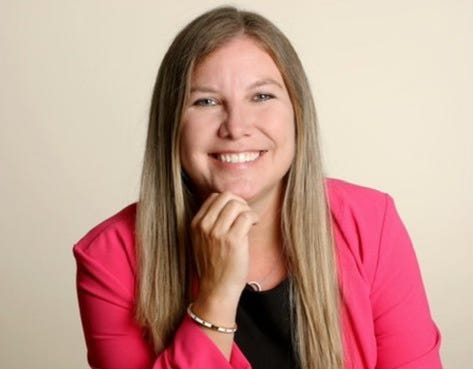
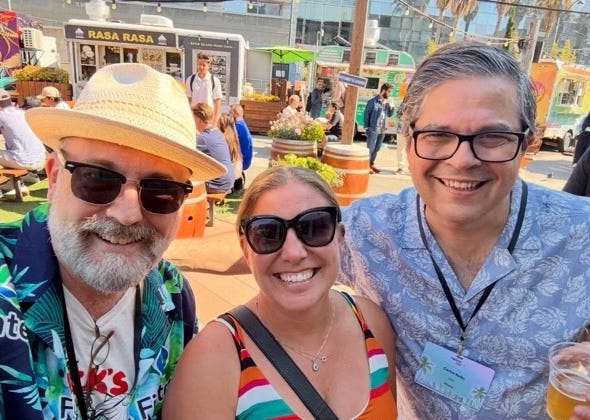
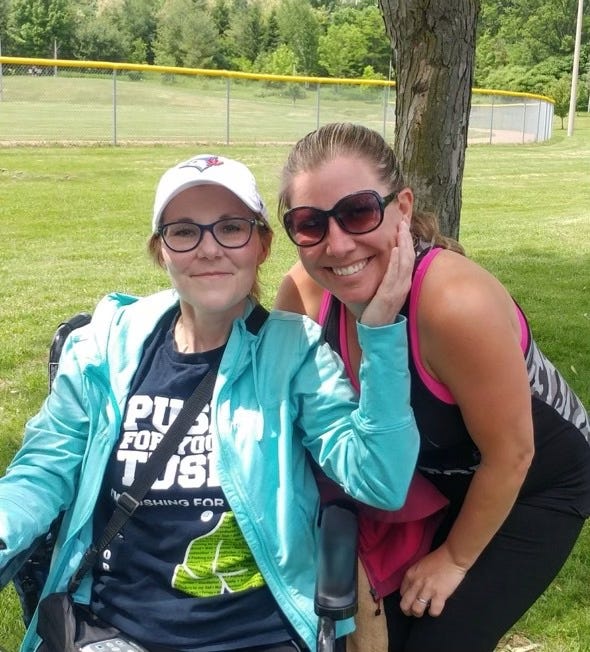
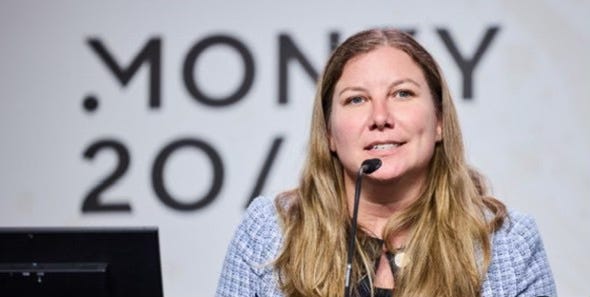
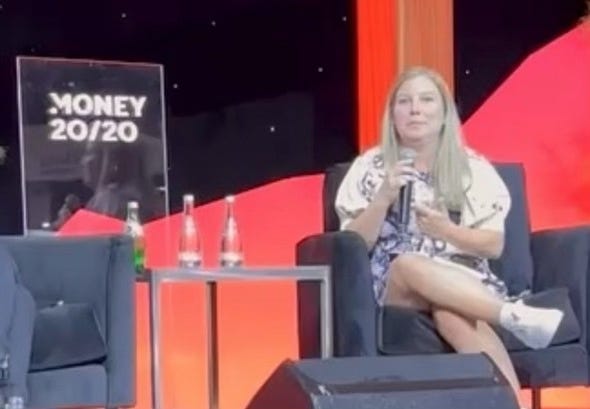
Love this. Developing tech for tech’s sake isn’t the end game. It’s all about serving human beings.